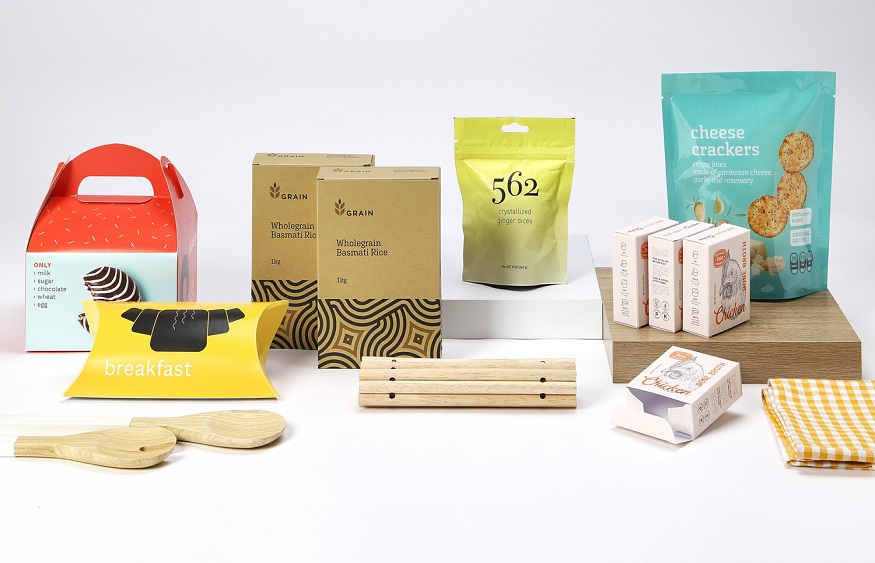Need Custom Labels for Food Packaging
Being seen on the shelf is essential in the fiercely competitive world of the food market. Custom food packaging labels have become crucial for food makers and producers. These labels have many uses, including establishing a brand identity and guaranteeing product safety. The significance of custom labels for food packaging, the function of a producer of food product labels, and the incorporation of labels in food packaging will all be covered in this article.

Using custom food packaging labels to establish one’s identity
First impressions are essential.
Customers are overwhelmed with options when they shop for food products online or in the aisles of a grocery store. The package is what draws their attention first. A well-made personalised label can significantly impact the success of a product.
Labels for custom food packaging allow companies to develop a distinctive and enduring character. They offer a chance to present the brand’s personality, values, and narrative. Customised labels set the tone for the business, whether a joyful, vibrant design for a kid’s snack or an elegant, simple title for a premium product.
Recognition of brands
Build brand recognition by being consistent. Customers are more likely to stay loyal to a brand when they can quickly recognise the goods by their label. Consider recognizable trademarks like the Nike swoosh or the golden arches of McDonald’s. These trademarks are easily identifiable, and personalised labels significantly contribute to their success in the food sector.
Customised messaging
Label customization also enables targeted advertising. Depending on the product, businesses can provide essential details, including components, nutritional information, and usage guidelines. In addition, labels can be used to emphasise certifications like organic, gluten-free, or non-GMO, satisfying the demands of consumers concerned about their health.
Future Directions for Personalised Food Packaging Labels
Looking ahead, personalised food packaging labels will likely keep developing to satisfy the shifting demands of both businesses and consumers. As technology evolves, we can anticipate seeing innovative features on brands, such as temperature indications to guarantee food safety or even interactive aspects that offer up-to-the-minute product information. Sustainability will remain a top focus, with labels becoming increasingly eco-friendly and highlighting a brand’s dedication to environmental responsibility. Custom tags have an exciting future, simultaneously promising innovation and sustainability.
The Function of a Food Product Label Creator:
Efficiency and accuracy
A food product label maker is the artist’s tool for creating personalised food package labels. These specialised devices expedite the label-making procedure and guarantee accuracy. They make it possible for companies to manufacture labels massively, cutting costs and production time.
Flexibility in Design
The designers of food product labels provide many different design alternatives. They enable innovation in packaging because they can print labels in various materials, sizes, and shapes. These devices can produce labels for containers, whether a giant cereal box or a little spice jar.
Regulations and Compliance
There are stringent labelling laws that apply to the food business. A company that creates food product labels ensures that these rules are followed, assisting businesses in avoiding exorbitant fines and troublesome legal issues. It ensures that all pertinent details, including allergen warnings and nutritional information, are printed on the label.
Labels in Food Packaging: Integration:
Maintaining Safety and Freshness
Label in food packaging have functional as well as decorative uses. They support maintaining the product’s safety and freshness. For instance, “best before” or “use by” dates are frequently included on the labels of perishable goods to let consumers know when the item is safe to eat.
Traceability and tracking
Additionally, labels can be essential for tracking and traceability. A well-documented labelling system can aid in promptly identifying contaminated batches in the case of a product recall. In addition to preserving consumer health, this also keeps the brand’s reputation.
Considering the Environment
Concerns over how packaging materials affect the environment have grown in recent years. Sustainability can be incorporated into the design of custom food packaging labels. Utilising eco-friendly materials and emphasising recycling on the title can appeal to buyers concerned about the environment.
Custom food packaging labels have evolved. Customised food packaging labels have come a long way since their modest beginnings. Initially, titles were frequently simple and functional, primarily used to indicate what was inside a package. However, as the food industry’s competition grew, companies realised they needed to spend money on more attractive and valuable labels.
Innovate and Design The emphasis on design is one of the significant changes in custom labels for food packaging. These days, labels are painstakingly designed to capture the spirit of the product and the brand. Innovative fonts, vivid colours, and creative images are used to grab customers’ attention and make a lasting impression.
Additionally, technical development has made it possible for creative label designs. To give customers a sensory experience, holographic labels, 3D effects, and even scented labels are now possible. These improvements not only distinguish products but also improve the brand’s reputation.
Individualization and Customer Involvement : Custom labels now frequently include customization thanks to the development of digital printing technologies. Labels can directly be printed by businesses with customised text, graphics, or even customer names. This degree of personalization promotes a stronger bond between the company and the customer while also fostering a sense of exclusivity. Labels also include augmented reality (AR) and QR code functionalities to engage consumers further. Customers can access websites with product details, recipes, or interactive content by scanning a QR code on a label, which improves the overall product experience.
Labelling and sustainability : The importance of sustainability in packaging, including brands, has increased recently. Consumers who care about the environment seek goods with a less negative environmental impact, which has influenced label design and materials. Many companies choose recyclable or biodegradable label materials and use simple, waste- and ink-saving designs.
Conclusion : Custom labels can mean the difference between a product remaining on the shelf and flying off it in a competitive market where consumers make split-second selections. They are the quiet marketers of the food industry, effectively and subtly communicating to consumers the value and message of a brand. Therefore, the solution is obvious: personalised labels for food packaging are not just a need but a necessity for any food business trying to prosper.
